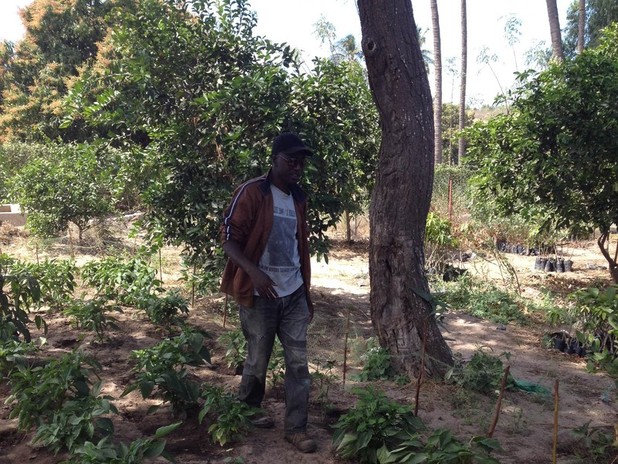February 18, 2014
The IDEO.org team, working with the Rockefeller Foundation to address post-harvest food spoilage, spent much of their time in Senegal in the field speaking with rural farmers about local farming practices.
While touring Senegal to talk with farmers about their crop production and losses, we traveled to Mboro to speak with master farmer Cheikh Senghor. Affable and charming, Cheikh welcomed us to his plot, a test farm he runs in conjunction with a Peace Corps training program. During the tour he showed us various techniques he’s experimenting with, most notably double-digging his onion beds. His sandy plot is common in Senegal’s veggie belt, but he thinks that the onions will grow better if they’re planted deeper in the soil.
After the tour, we retired to the shade of a vast mango tree, a spot Cheikh refers to as his “white house.” We learned a lot about farming practices, farmer behavior, and how to succeed in farming in Senegal during our two-hour discussion. Here are some of the highlights from our conversation.
Three Ways to Sell Onions
“There are three ways that I try to sell my onions. The first, and best, is to have an order. When I have an order for onions then I can negotiate a good price and the person who buys them comes to pick them up. I can harvest them just before he picks them up and they’re least likely to spoil.
“The next best way is to take them to a market, though there you pretty much wait for God. I may sell my onions today, I may sell them tomorrow. But I can’t wait past tomorrow or they’ll spoil.
“The third way is to call a friend in a distant town. She’ll tell me if the price is good for onions and if it is I’ll send them to her to sell. But of course, she takes a cut. If I sell them for 500 CFA per kilo, she gets 100.”
Cold Comfort
“The biggest problem for farmers in Africa is that we don’t have cold storage.”
Help! I Need Somebody
“Farmers are looking to outsiders for help, but we also have to help ourselves. We must show commitment to whatever we’re doing.
“But when groups want to offer help, they should do a few things. First, they should know the farmer. What’s his name? Where does he live? We’re not all the same. Next, he should understand how dedicated the farmer is. Some people here are lazy and crazy.
“An example from my life is that once there was a Peace Corps guy named Richard and once I told him that I work as a farmer he gave me all sorts of advice. I did everything he said and it worked so then I called him so that he could see it.
“Knowledge is large, and what I know is not enough. Any time, knowledge is welcome.
“People here want to see results. Most farmers won’t just take advice. They need to see results. They have to see because many of them cannot read or write. If you show them, then they’ll know.”
Cash Crops
“Many people harvest their crops too soon to solve personal problems. If your wife is sick or your child needs to go to hospital, you have to pay for that. Sometimes you harvest your plants before they are ready so that you can sell them and pay a bill. It’s not good, but you have to do it.
“Sometimes a farmer can get a loan, maybe from the government or a bank, but often there is no supervision on how he spends it. So some guys take the money to get a nice wife, some cows, whatever. Then he defaults on the loan, he gets sent to the police, and then he’s in jail.”
Pool Party
“I’ve never seen people pool money to buy something, but I know that they want to. Everything is expensive—trucks, seeds, fertilizer, whatever—so if you have extra money to spend, you want to spend it on a sure thing. When you finance through a bank it’s guaranteed, but if you give your money to me to manage a group purchase, I could go spend it on something else. Even some organizations they eat away at farmers’ money. That’s why people are scared to get together.”




